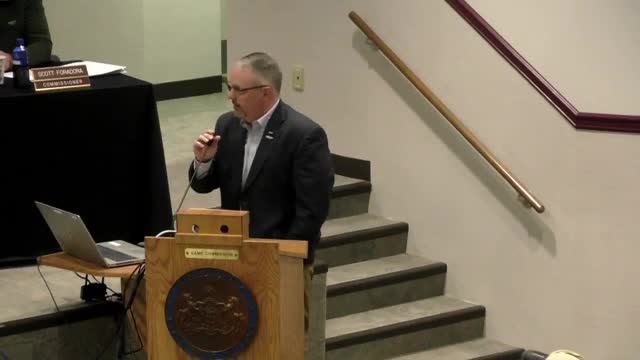Game Commission outlines proposed land exchange with DCNR over Glen‑Inoco Falls, cites public‑safety concerns
Get AI-powered insights, summaries, and transcripts
Subscribe
Summary
Pennsylvania Game Commission staff outlined a proposed land exchange with DCNR that would move the high‑use Glen‑Inoco Falls gorge from State Game Lands 141 into Lehigh Gorge State Park management and give the commission parcels it says are better for wildlife management.
Pennsylvania Game Commission staff described a proposed land‑exchange with the Department of Conservation and Natural Resources (DCNR) that would transfer the high‑recreation Glen‑Inoco Falls portion of State Game Lands 141 to DCNR and in exchange consolidate other parcels that the commission says better support wildlife habitat and the agency’s management mission.
A commission presenter reviewed the historic recreational use of Glen‑Inoco Falls (often called Glen Onoco or Gleninoco in meeting materials), noting the site’s history as a tourist destination dating to the 19th century and the presence of a former hotel at the base of the gorge. Staff said recreational visitation increased markedly after about 2008, driven in part by social media, and that increased visitation has led to frequent injuries, multiple fatalities and heavy burdens on local emergency responders. “We’ve had somebody up there that fell and broke their ankles and had to be recovered,” a staff speaker said while reviewing the site’s safety record and signage that attempts to restrict access.
Staff told the commission that the Game Commission’s core mission is wildlife and habitat management, not high‑use recreational trail maintenance, and that DCNR—whose state parks bureau specializes in trail management—would be better placed to manage the gorge’s high‑use recreation. Staff said the portion proposed for transfer comprises about 492 acres (final acreage to be determined by survey) along the gorge. In exchange the Game Commission would receive a smaller acreage parcel—described in the presentation as about 368 acres—from lands currently in Lehigh Gorge State Park and also gain several DCNR parcels on Ford Island in Crawford County (Pymatuning area) to consolidate management around the planned Pymatuning Learning Center.
Staff showed maps indicating the parcels currently designated State Game Lands 141 (some bought with Game Fund dollars and some with Pittman‑Robertson federal dollars), the Lehigh Gorge State Park lands and the parcels proposed in the exchange. Staff said the exchange would reduce the commission’s responsibility for high‑risk recreational infrastructure in the gorge while giving the commission more contiguous, “huntable” habitat that staff consider higher‑value for wildlife management.
Presenters said structures on Ford Island currently used by DCNR staff would eventually be removed after the learning center is built and DCNR identified alternate housing for park staff; staff said the learning center is not yet constructed and such removals would occur over several years.
Staff characterized the proposed exchange as the result of multi‑year discussions among the Game Commission, DCNR and the governor’s office, including a funding allocation in the governor’s 2025 budget to give DCNR resources to undertake necessary trail, safety and park improvements. No final transfer or property surveys had been completed at the time of the briefing; staff said the exchange remains subject to boundary surveys and interagency agreements.
The commission did not take a final vote during the briefing; staff said the item would appear on the commission’s agenda the following day as a real‑estate transaction for formal consideration.
